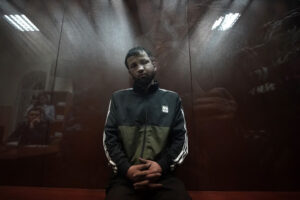There is much that remains murky about Shamsud-Din Jabbar, who rammed his truck into New Year’s Eve revellers in New Orleans, murdering 15 of them. But we do know this much: He was Texan-born and -raised, an Army veteran who spoke with an East Texas drawl, forced to shack up at a trailer park after his career and love life went sideways. In short, he was as American as gas-station apple pie, loaded with carcinogens and carbohydrates, wrapped in a plastic sleeve that will be floating shortly in a waterway near you.
America put Jabbar together, America took him apart.
Domestic terrorism is frightening precisely because it incubates within the body politic. If a terrorist is a foreigner, it can be said that he failed to appreciate the resplendent magnitude of America’s promise. He had never donned a beer helmet. He didn’t understand the glories of Must-See TV. Or else he understood it all too well, swelling with murderous resentment. But the domestic terrorist is an autoimmune disease, assailing the very system that nurtures him. Jabbar hardly spent the last several months training at some terror camp in the Hindu Kush; until recently, he had worked at consulting firms such as Deloitte, where, according to The Wall Street Journal, “he was paid the equivalent of nearly $125,000 a year.” This guy’s network was LinkedIn, not Al Qaeda.
After each mass shooting or terror attack, we begin the collective actuarial task of apportioning cultural and political blame. After the 2013 bombing at the Boston Marathon, Salon published an article under the remarkable headline: “Let’s Hope the Boston Marathon Bomber Is a White American.” The author, David Sirota, is no fool: He was trying to make a point about how Muslims are unfairly blamed en masse after paroxysms of Islamic fundamentalism. And, yes, his outlet was going for clicks. But he and his editors were also playing the game we always play.
In Jabbar’s case, the blame game is deceptively straightforward. He was a convert to Islam and adorned his truck with an ISIS flag. To commentators on the political right, this was the “globalized intifada” that the most ardent pro-Palestinian activists have been calling for. It’s notable, though, that he seems to have turned to jihadism only recently, as personal disappointments and financial obligations piled up. Islamism was the last, deadly stop on his journey to all-American loserdom.
It is, of course, of paramount importance to investigate Jabbar’s ties to extremist groups. But those determined to tether him to radical Islam miss the point. Jabbar had far more in common with Adam Lanza, the Sandy Hook killer, than with Osama bin Laden: A quiet rage builds over the years. Marriages fail. Ventures collapse.
Just watch the 2020 video Jabbar recorded to promote his real-estate business. He is crisply dressed and uses all the right corporate lingo. His office is neat, with a poster touting “discipline” behind his right shoulder. But there is no enthusiasm to his voice, no light in his eyes.
There was a time when the military was a route into a decent life, especially if followed by a college degree. Jabbar was a veteran and college graduate, but these institutions didn’t provide him with stability — or a sense of community. And if his social-media feed is anything like yours, or mine, it was full of glamorous people living their best lives, shifting the paradigm, crushing it, leaning in. It isn’t difficult to imagine the widening gulf between the real and the digital becoming intolerable.

His military service is a notable and alarming indicator, one he shares with another recent attack. Shortly after the carnage in New Orleans, a man later identified as Matthew Livelsberger blew up a Tesla Cybertruck outside the Trump International Hotel Las Vegas, killing only himself while wounding at least seven. Both Jabber and Livelsberger served in the US Army and had received multiple commendations. They served their country before turning sharply against it. And though we all think we know why — Palestine, the manosphere, guns, Trump, video games, Soros, vaccines — the truth is that the breakdown is more complicated, and more perniciously institutional, than such narratives permit.
Abandoned by elites over Vietnam — a war engineered by so many of our best and brightest that they should have held the 1965 Yale-Harvard football game in Saigon — the armed forces have never really recovered their standing. Nor, it’s worth noting, has the US military won a major conflict outright in nearly a century. Today, the military reflects American pathologies instead of expunging them—and those issues are far deeper than whatever “wokeness” exercises Trump and his nominee to lead the Pentagon, Pete Hegseth.
Other cases are even harder to fathom. Just hours before the slaughter in New Orleans, the FBI arrested a Virginia man who was in the possession of “the largest cache of ‘finished explosive devices’ ever found in the FBI’s history.” According to The New York Times, the suspect, Brad Spafford, had a #NoLivesMatter insignia on his backpack. He wasn’t a social-justice activist (#BlackLivesMatter), nor a pro-police conservative (#BlueLivesMatter). Spafford was a nihilist. He simply wanted to kill.
The loss of institutional integrity is everywhere, and you can plainly see it. A few years ago, Tablet editor Alana Newhouse wrote an essay headlined “Everything Is Broken,” in which she advised readers to “give up on our current institutions,” since “they already gave up on us.” That is perhaps possible if you have sufficient social capital, as well as capital in the bank account. But if you are Jabbar, already living on the margins, dragging failed businesses and failed marriages behind you, giving up isn’t going to look quite so easy.
What I mean to say is that Jabbar didn’t “fall through the cracks,” as the cliché goes. The cracks have widened into canyons spanning entire sectors of society. Sure, maybe a social worker missed obvious warning signs. But what ails the people, no social worker can fix. That is not to malign programs that help veterans suffering from PTSD, women escaping abusive relationships, or those struggling to pay their mortgages. These are necessary in a country that makes mere existence into a savage free-market contest. But perhaps we should think about what it is that we exist for, other than mere animal survival.
It takes no great leader to condemn a killer like Jabbar. But it will take an exceptional figure to name, let alone address, the societal ills that he and Livelsberger and Spafford embody. Doing so will not be politically expedient. But it is also necessary. We can’t go on much longer treating the Dow Jones Industrial Average as the true index of our collective health.
After the attack in New Orleans, there was some discussion among the relevant parties over whether the Sugar Bowl — a high-stakes football game — should still take place at the Superdome. The decision was made to postpone until Thursday night, whereupon fifth-ranked Notre Dame blunted second-ranked Georgia’s formidable air assault, the Fighting Irish beating the Bulldogs, 23 to 10.
The question of whether a football game is to be played after a national tragedy is truly one of the great modern quandaries of our time. Two days after John F. Kennedy was assassinated in Dallas, the Dallas Cowboys played the Cleveland Browns in Cleveland. It wasn’t a happy contest. “This was a game that nobody was interested in playing, coaching, watching, or writing about,” a columnist observed.
And yet the show must always go on. There is a relentlessness to American life that foreigners perceive more readily than those born here. “The essential American soul is hard, isolate, stoic, and a killer,” D.H. Lawrence observed. “It has never yet melted.” In the decades since that observation, it has only become more true, not less. When, in 2001, the NFL cancelled a weekend of games in the wake of 9/11, Brian Billick, who coached the Baltimore Ravens, disagreed with the decision. “I don’t want cowards to dictate what we do in this country,” he said, “That’s where my anguish is right now.”
If we had real public intellectuals, perhaps they could help make sense of the moment. But they ceased to matter long ago. Now, you head to X (the app formerly known as Twitter), which will give you the take you already had, just a few notches angrier. The same huge and impersonal forces that ripple through all of us can crack some. If you have the material and psychic armaments needed to survive a moment such as ours, consider yourself lucky. Fewer and fewer people do.
And yet, the show goes on. Before the rescheduled game, NPR ran a segment about the Sugar Bowl and the people who attended despite the attack. An on-the-ground correspondent spoke with a man from Cincinnati who had come with his son, both “decked out in Fighting Irish gear.” The fan said that he had been watching the news and had come to the conclusion that it was safe to be there. “So, I have no issues,” he said, failing to understand that he was being asked a moral question that went beyond his own safety.
As if to help him along, the correspondent explained that the fan had been “a senior at Notre Dame back in the 1981 Sugar Bowl, when the Fighting Irish played Georgia and lost big time.” Back in the studio, the host chuckled. “OK, so he’s looking for payback,” she said.
Disclaimer
Some of the posts we share are controversial and we do not necessarily agree with them in the whole extend. Sometimes we agree with the content or part of it but we do not agree with the narration or language. Nevertheless we find them somehow interesting, valuable and/or informative or we share them, because we strongly believe in freedom of speech, free press and journalism. We strongly encourage you to have a critical approach to all the content, do your own research and analysis to build your own opinion.
We would be glad to have your feedback.
Source: UnHerd Read the original article here: https://unherd.com/



